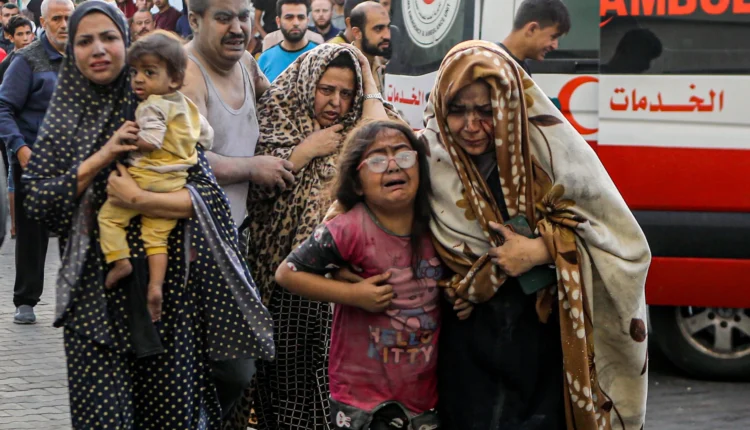“There is no lonelier place in this universe than around the bed of a wounded child who has no more family to look after them,” British doctor Ghassan Abu Sittah, who is working in Gaza City, posted online.
Normally a plastic and reconstructive surgeon in the UK, in Gaza he has been working at the Al Shifa hospital in Gaza City, treating people wounded in Israel’s retaliatory air strikes after Hamas launched a deadly attack against Israel, killing at least 1,400 people.
About 40% of the wounded people being brought to hospital were children, he told BBC Radio 4.
“It’s all blast injuries, there are these horrendous injuries with shrapnel and burns and fallen masonry, people being dug out from underneath the rubble of their homes,” he told the BBC.
He describes the scenes he’s seeing in Gaza as “the phenomenon of wounded child, no surviving family”.
“Every day we have these cases where we are told this is the only surviving family member,” he said.
On Sunday he said he treated a five-year-old girl with burns and another four-year-old girl also with facial burns and a head injury.
“They were the only ones who were dug up from the family home as survivors,” he said.
Days earlier he found himself operating on the child of a doctor at Gaza City’s al-Shifa hospital. The doctor had been killed with her other child and the wounded girl was the only survivor.
Authorities in Gaza say at least 2,750 people have so far been killed, a quarter of them children, and nearly 10,000 people wounded. Another 1,000 people were missing and believed to be under rubble.
Carolyn Housman runs CFAB, an international social service network that will work to help those left orphaned by war.Her organisation cannot predict the scale of those left without family members yet, but it will be “huge”, she says.”Very often children can be used for tactical advantage, for example by taking them hostage,” she says.
Hamas has taken nearly 200 hostages into Gaza, including young and disabled children. Negotiations over their release and that of women also taken hostage are reportedly taking place.
“We are working to reconnect children from either side of the war to their families, regardless of their circumstances,” she says.
Some of this is done through an inter-country social work team who undertake assessments of family members overseas to see if it would be in the child’s best interests to live with them.
In the UK, cases are then processed by family courts to determine the outcome for the child.”Any child who loses parents as a result of war will be traumatised by this experienced and it will be a long road of recovery for them,” she said. “There will be hundreds, if not thousands affected by this.”
In Gaza, groups working with refugees said there had already been a huge demand for psychosocial support and counselling for young people before the latest war.
“Now with the trauma, PTSD and depression children are going through, it can only be getting worse,” said Tamara Alrifai from the United Nations Relief and Works Agency for Palestine Refugees (UNRWA).
Dr Abu Sittah says about 40% of those being brought to hospital are children
Dr Abu Sittah meanwhile says that his family in the UK has been visited by British counter terrorism police.
In an interview with the BBC’s Newsnight programme he said that his family were questioned and it is now being taken up with his lawyers.
He said: “I need to find out why someone thought it was a good idea to ask my wife which part of the hospital I’m in, who paid for my ticket, and which charity I work for.”
“It’s a kind of brutish attempt at harassment… as if my wife did not have enough to worry about,” he added.
In a statement the Metropolitan Police told the BBC: “On 16 October, police officers responding to a report that a man was planning to travel to a war zone attended an address in north London where they spoke with one of the occupants.
“Having identified that the man had left the UK for humanitarian purposes, the officers signposted the occupant to current FCDO advice.”
Dr Abu Sittah says many people in northern Gaza have not followed the Israeli military’s warning to move to the south of Gaza to avoid being targeted.
They have stayed in their homes, he says, because the areas said to be safe are being targeted “with the same ferocity” as those that aren’t.
Meanwhile it is “not possible” to evacuate Al Shifa hospital, he says, where most of the patients are “critically wounded”.
Many of those staying in their homes in northern Gaza also fear they may be forced out of the territory entirely.
“Becoming refugees is such a formative part of Palestinian identity and people just do not want to go through this again, and so people are staying put,” he said.
Source: BBC


Comments are closed.